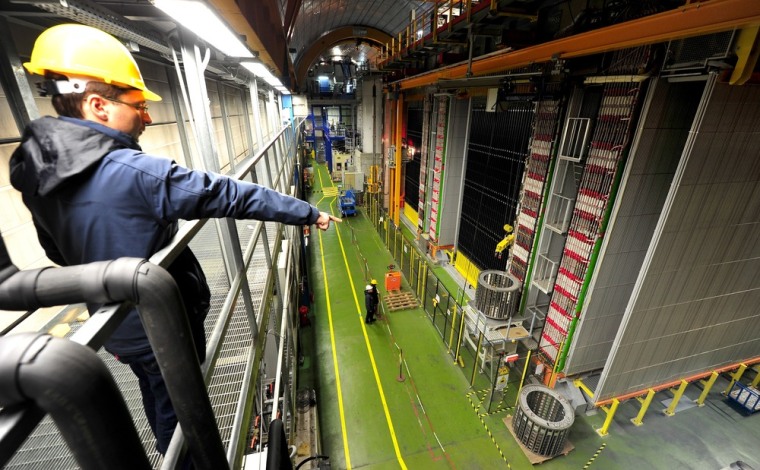Physicists are to run new tests in May after Thursday's confirmation that a faulty connector could have been behind findings appearing to show that one of Albert Einstein's fundamental theories was wrong.
Last fall's results from the OPERA experiment appeared to contradict Einstein's 1905 special theory of relativity, by suggesting that subatomic particles called neutrinos could travel fractionally faster than light.
Einstein's theory, which underpins the current view of how the universe works, says that nothing can travel faster than light. For decades, superluminal travel has been used as a science-fiction device to enable backward time travel, warp-speed exploration and other fictional wonders.
Europe's CERN research center said two possible effects had been identified that could have an influence on its neutrino timing measurement during its OPERA experiment. "New measurements with short pulsed beams are scheduled for May," it said in a statement. A similar statement was issued by Italy's INFN research center, which has been working with CERN on the experiment.
The OPERA experiment involves shooting neutrinos from CERN's facility on the French-Swiss border to INFN's Gran Sasso National Laboratory, 450 miles (732 kilometers) away. The faster-than-light finding was recorded when 15,000 neutrino beams were pumped over three years from CERN to Gran Sasson.
CERN said one of the potential effects concerned an oscillator used to provide the time stamps for GPS (Global Positioning System) synchronizations, which could have led scientists to overestimate the neutrino's time of flight.
The other effect appeared likely to be more significant in the faster-than-light finding of the original OPERA experiment.
"The second concerns the optical fiber connector that brings the external GPS signal to the OPERA master clock, which may not have been functioning correctly when the measurements were taken," said CERN. "If this is the case, it could have led to an underestimate of the time of flight of the neutrinos."
Physicists had long suspected that some experimental flaw was behind the faster-than-light results but could not put their finger on it — until now. "A possible explanation has been found. But we won't know until we have tested it out with a new beam to Gran Sasso," CERN spokesman James Gillies told Reuters.
When the results were first reported, OPERA team members said they had checked and rechecked the experiment for many months, looking for anything that could have produced a misreading.
A second test whose results were announced in November appeared to provide further evidence that neutrinos were traveling faster than light. But many experts remained skeptical.
University of Chicago physicist Edward Blucher said the original finding would have been breathtaking if it had been true. As it was, the research inspired many spirited discussions, if few believers.
"I don't think I met anyone who said I bet it's going to be true. I think the people on the experiment worked as carefully as they could, and I think they ran out of ideas of what could be wrong and they decided to present it," he said. "Maybe they should have waited a few more months."
More about the neutrino controversy:
- Potential flaw found in faster-than-light setup
- Faster-than-light neutrinos pass test
- Neutrinos spark wild scientific leaps
- Faster-than-light neutrinos? Not so fast, some say
- Challenging Einstein is usually a losing venture
- Interactive: Putting Einstein to the test
This report includes information from Reuters and msnbc.com.
